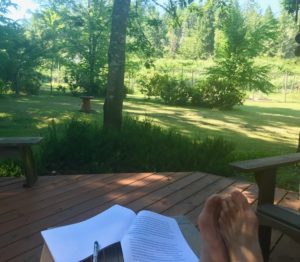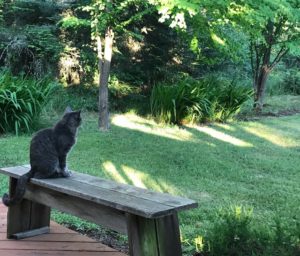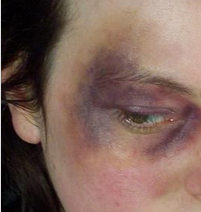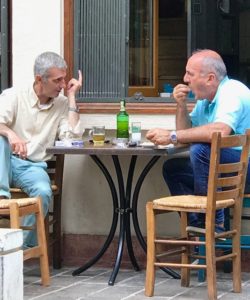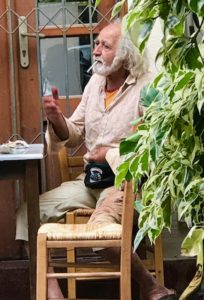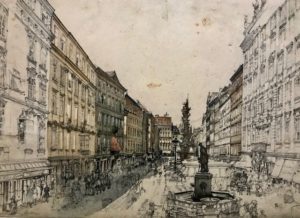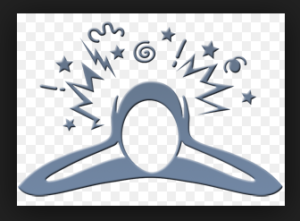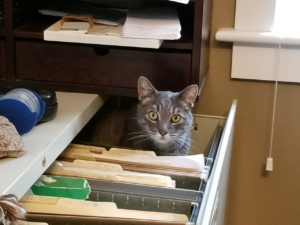Category — Life
Ups and Downs
Life is not a carnival. Life is not a bowl of cherries. Life is a rollercoaster ride. We all know that.
One day you learn that one of your books has been optioned for film. The next day your agent shits all over your new proposal. One day one of the guys you work with at the prison wins first place in a national writing contest. The next day another of the guys you work with is denied parole. One day you watch four hummingbirds feast on the crocosmia. The next day the deer break into the garden and eat all the lettuce.
You can choose to be on the rollercoaster, which means that when lovely things happen, when good luck befalls you, when the sun shines, you are ecstatic. But when the tide turns, when the clouds roll in, when the shit hits the fan (choose your cliché), down you go. You ride the rollercoaster, alternating between various degrees of bliss and despair.
Or not.
You can adopt a detached attitude. You can watch the rollercoaster but not get on. You can appreciate a turn of events without yourself turning. You can note that life has its ups and downs without losing your lunch over it. No expectations. It is what it is, as they say.
They say. Not me.
I am a rider. I know that sometimes this makes me anxious, cranky and unhappy. But I also know that sometimes I can really soar.
Years ago I noticed a small lump on my shoulder. Since, as everyone who knows anything (and many who know nothing) knows: lump=cancer, I immediately imagined all of the kinds of cancer it could be, including ones I made up. I imagined going to the doctor, who ordered a full body scan (or maybe exploratory surgery). I imagined the doctor coming back after the procedure to tell me that there were tumors everywhere, that there was nothing to be done. During the week I waited for the actual doctor’s appointment. I ate little, slept little, worried incessantly, mentally sorted through my possessions to decide which kid would get what.
A week later, an actual doctor, not the one in my head, looked at the lump on my shoulder. For a split second. She declared it a lipoma (a completely benign rather common lump of fat that occurs between the skin and the underlying muscle) and asked if I’d like it removed.
An hour later, lump-less,I treated myself to breakfast at The Glenwood. I ordered a mushroom, onion and cheese omelet. It was the best omelet I have ever eaten in my life.
July 18, 2018 5 Comments
For granted
You know when you’re sick and then you get better, or when you’re in pain and then pain goes away, how you have this moment of pure exaltation, this blast of unfettered happiness, this glorious sense of goodness, wellness, rightness… and you tell yourself: I’ll never take my health for granted again? And then, a day later (an hour later) there you are, taking it for granted again.
This morning, early morning, I was sitting outside on the deck reading a manuscript, a first novel by an old friend, and the birds started singing. I mean singing. Not tweet-tweeting. I’m talking lilting melodies. And there was this soft breeze with just a hint of coolness. And I looked up from the pages on my lap at the intense green that is mid-June in Oregon. And the peace of it, the beauty of it, the privilege of it washed over me. It staggered me. And I thought: I will never take this for granted again.
But I will.
June 20, 2018 5 Comments
The cost of being beaten
I know someone who’s been battered. Attacked, punched and kicked.
When those of us to whom something like this has never happened think about it, if we think about it, we think about the psychological cost. What it means to have an intimate partner hurt you. How it changes the way you look at relationships. How it curdles love. How it erodes self-esteem. How it destroys trust. Women who are battered often stay with their batterers. The batterers apologize and swear it will never happen again. Or they tell the women that they deserved the beating. Or they threaten to do something worse if the women try to leave. Imagine living with someone you are terrified of.
Now suppose, on top of all that, as you are struggling to make sense of your circumstances and think about your life and fight the fear you feel and try to gather the strength to leave, you get five separate bills in the mail, from urgent care, where you went that first night, and the hospital emergency room, where you went the next day when you couldn’t breathe, and the ER doctor who saw you and the technicians who X-rayed and MRI-ed you, and the lab that did the blood work. And the bills total $11,699.
You did not spend a night in the hospital. You did not have a procedure or surgery or get a cast. You were not given any medication. You were simply examined. This is what it cost to find out that you didn’t have broken ribs or a concussion. This is what it cost to find out that, in addition to the multiple contusions, you have a spinous process fracture of a lumbar vertebra. Where he kicked you. When you were on the floor.
(And yes, thanks to Barack Obama, there is insurance. And the insurance will cover a significant portion of it. But what it doesn’t cover equals more than two months take-home pay. You know, the money you need to save so you can leave.)
With deep thanks and profound respect for the person who allowed me to tell this story.
The photo is cropped from a Google image. It is not the person I am writing about.
May 30, 2018 1 Comment
Familiar Surprise
Yesterday I sat at a little table in a leafy public square nursing first a cappuccino and then two bottles of mineral water while I read a book and people watched, although not in that order, for three hours. Three hours. This is unusual behavior. In fact, the last time I did something like this was the last time I was in Chania (Crete) a year ago. It’s not that I don’t read for hours. It’s not that I don’t drink cappuccinos and mineral water. But people who hang out in public squares in my home country are often the most desperate folks who have nowhere else to go. Sanitized, “safe” public squares are commercialized and/or visibly policed. I have never been tempted to hang out in one for more than a few minutes.
In Splantzia Square, there were groups of old men talking, women with children who chased pigeons, a table of bearded, black-robed Orthodox priests involved in lively conversation, an adventurous little girl on a pink tricycle who momentarily became the center of attention, a man in rumpled linen who looked like he stepped out of a Rembrandt painting, a roving accordionist, four cats (one sleek and well fed, three lean and hungry) and perhaps the most interestingly ugly dog I’ve ever seen.
Life lived for all to see. Public life.
For me, traveling (and temporarily living) in Europe is what is known in storytelling circles as a “familiar surprise.” These countries—on this trip, Austria, Greece—make “sense” to an American. I recognize the many similarities that come from shared philosophies, religion, forms of government (not to mention the thick overlay of U.S. cultural products). Everyone wears jeans. There’s bad pop music on the radio. Same old, same old.
But threaded through, interwoven with the familiarity is the very very different way people live their lives here. There is this public life, in the squares, in the outdoor cafes (in all weather) most of us don’t live in the U.S. There is a joy in extended conversation, hours of conversation, dawdling over dinner, a long lunch with friends not a quick bite eaten at a desk, coffee enjoyed at a street-side table not drive-through coffee downed in a car. There is a distinctly unAmerican pace, reflected in the shorter work weeks, the number of sanctioned state holidays, the frequent festivals and celebrations, the above-mentioned square-sitting. (Interesting factoid: Our long work week, lack of paid holidays and meager vacation time do not add up to top place in worker productivity. All four of the European nations with higher productivity than us have MUCH shorter work weeks.)
The familiar surprise. I love it.
May 23, 2018 4 Comments
How we see the world
We think about, or sometimes try not to think about, how quickly the world is changing around us. I am talking about technology. This is a subject about which I am profoundly ignorant. But I have opinions, dammit!
Every day we are asked to update something (yesterday’s version being, so, you know, yesterday). Every day there are new Apps (like Run Pee, which tells you when you can run and pee without missing an important moment in the movie you are watching). Every day there are new gadgets, new devices. Just 20 years ago I carried a camera, an audio recorder, a note pad, a pen, a little telephone number book, maybe a map, often a pedometer. I wore a watch. My computer sat on my desk next to my telephone answering machine. I had to brush my teeth with a twig. Okay, not that.
Now I have one device—the Austrians call it a “handy,” and it is—that does all of that, and more. That is a huge change. And a fast change.
Yesterday I was reminded of a change I hadn’t really thought about that is far more profound: the change in how we get the images that we hold in our heads. Of course we form those images through seeing, through direct experience. But we also “see” by looking at the images others present us. Today, we see the world through Google images or through posts on Instagram or Facebook, YouTube, satellite pic sites, someone’s blog. We can see everywhere and anywhere, a click, a split-second: Here is the spice market in Istanbul. Here is the Vatnajökull glacier. Here is the backyard of the house I lived in as a child that I have not visited for thirty years.
But what about before the Internet. What about before photography? How did people “see” what they did not experience?
The Aquarell (watercolor) exhibit at The Albertina Museum had one answer for this. Many of the paintings in the exhibit were delicate, evocative, almost ethereal, the way watercolor can be. But the subtext is what interested me. Some of these painters were engaged by adventurers, noblemen and others to document their journeys. The painters used water color—first sketching with pen and ink, then adding color later—because this was a fast way to make a picture, to capture an image: a Parisian street corner, an alpine glacier, a “Gypsy” encampment. They brought the images back as visual records. It is how others saw those distant places. Imagine that.
Imagine never having left your village in Tyrol. Imagine now a trip to Vienna, once in a lifetime. There you see the work of a watercolorist who traveled with a noble across the European continent and chronicled what he saw. Painted it. Those luminous, delicate, evocative images are how you now experience that place. Imagine. I almost can’t.
May 16, 2018 No Comments
Life in the no-Trump zone
Here’s the weird thing. Whenever I’m way from Oregon, even for just a few days, even if I’m just up in Seattle, I get heart-sick. I don’t mean that metaphorically. I mean I really get sick. I get a pain in my chest and a lump in my throat. It’s a love-ache, like when you pine for somebody who’s not there.
But on the other hand, whenever I’m away from the United States, as I have been for the past week and a half, I feel joy and a lightness of being. I am exhilarated. And I am desperate to stay away, to distance myself from the madness, to make someplace else my home. A few days ago, strolling down a several-mile lane that cuts through the leafy length of The Prater (an extraordinary park in the heart of Vienna), breathing the sweet spring air, humming off-key, it suddenly occurred to me that I was not bludgeoning myself with thoughts about the sociopath in the White House and his lily-livered and unprincipled henchmen/women, or agonizing over school shootings, cop shootings, the NRA, or which new cowardly piece of shit had been called out for his cowardly piece of shit aggression toward a woman or, more likely, multiple women. You know, the new normal back in the Land of the Free and the Home of the Brave.
It wasn’t that I was ignorant of the goings-on state-side. I wasn’t on a news fast. The New York Times is delivered to my phone every morning, and I read it. I knew. But I had apparently entered into some meditative state where I acknowledged the information but achieved detachment from it. That’s what being 9 time zones away will do. That’s what being in a country with national health care and virtually free higher education and thirty paid days of vacation every year will do. That’s what being in a country with an incarceration rate ten percent of ours will do. What being in a country with a 98 percent literacy rate where the average amount of time spent READING A NEWSPAPER is 57 minutes will do. This alternate reality has Zenned me out.
And so, I will forgive this country its fat, white, soggy, cheese sauce-smothered asparagus and its Pay to Pee (few and far between) toilets. I will even forgive it for coining
Donaudampfschiffahrtselektrizitätenhauptbetriebswerkbauunterbeamtengesellschaft, a single, 79-letter word that means Association for subordinate officials of the head office management of the Danube steamboat electrical services. Because this a no-Trump zone. Almost. This morning’s der Standard had a (small) front-page story (no photo!) about our fine and thoughtful president and the Iran nuclear deal. It also included the photo that illustrates today’s blog, featuring two sane, well-spoken world leaders who appear to actually like each other. What a concept.
If it were not for Oregon, my Oregon, I would never return.
May 9, 2018 No Comments
Up, Up and Away
Airborne. 34,824 feet above the earth, following the Columbia east, then across Montana on a diagonal, nosing north to Regina on a path to the far reaches of Manitoba, cutting an arc across Great Hudson’s Bay, nipping the tip of southern tip of Greenland, then undercutting Iceland, before traversing a swatch of the North Atlantic. Boom. Europe in nine hours.
It is still all a miracle to me: How I can get to Amsterdam faster than I can drive to San Francisco. How this enormous machine with more than 300 people aboard can defy gravity. How I can sit here gazing out the window, taking cloud pics, writing, drinking Perrier with lime, when for so very many years I told myself I could not get on an airplane. I would not fly. I could not fly. I was a person who did not fly. That was my identity. That was the looped tape inside my head.
I had had one of those flying experiences early in my college years that makes you promise eternal devotion to God, vow to be good forever and swear to never ever be airborne again if only the plane you are on will land safely and you will not die. The plane landed safely. I did not die. God did not become a fixture in my life. I was not good forever. But I did keep one promise: I did not get on another plane for 25 years.
I didn’t stop traveling. I took trains back and forth across the U.S., a happy passenger exploring just about every Amtrak route in America. I had adventures. I wrote magazine stories about trains. I told myself that I was just a train person. Maybe so. But I was also a person afraid to fly.
And then, three things happened. (#1) I was riding along a particularly beautiful stretch of the Willamette River bike path on a particularly beautiful fall day, and I thought, all of a sudden: what if I just took off the (metaphorical) backpack weighing me down, the one with the old tapes about what I could and couldn’t do, what I convinced myself I was afraid of. What if I stopped my bike, shook off the damned backpack and just left it by the side of the road. Metaphorically, not litter-ly. So I did.
Then (#2) I met, through a friend, a lovely woman named Rosemarie who practiced something called “creative visualization, which I assumed was New Age bullshit. But it wasn’t. And she gracefully guided me through peaceful, empowering scenarios that allowed me to create new tapes inside my head.
And then (#3) I got a surprise invitation to be a guest on the David Letterman show for one of my books. (The short notice would make a train impossible). For some reason, I thought this would make my career, It didn’t. But it did get me on a plane. (I have a Xanax-dimmed memory of my husband dragging me down the jetway. It was an ordeal, #1 and #2 and psychopharmaceutial enhancements notwithstanding.) But I did it.
Since then, going on 20 years ago, I have boarded scores of planes in scores of airports to scores of destinations. That’s what I’m doing right now. I am on a big bird flying across a continent and an ocean and a chunk of another continent.
I write this not to boast about my travels but to tell anyone out there—and you know who you are—that you CAN replace that no-I-can’t/ no-I-never-will tape inside your head, you can write a new narrative, you can do what you have so long been afraid to do. You can take to the skies.
May 2, 2018 1 Comment
Test me! Treat me!
I am about to go off to the dentist for a routine hygiene/ cleaning appointment where, once again, I will be told I need a new set of x-rays, and once again, I will decline. I take good care of my teeth, see my hygienist three times a year, have no problems/ symptoms, and submit to x-rays every 3 years or so. That is ENOUGH.
I was thinking about this “testing for everything because we can” approach to medicine after reading Barbara Ehrenreich’s bold essay on “Why I’m giving up on preventative care.” She goes too far for me. I don’t see a colonoscopy as rape-by-machine, and frankly I’d rather have an innocent polyp removed than hang around waiting for it to maybe become something. And her point about testing and treating to prolong life doesn’t resonate with me. I am not interested in prolonging life. I am interested in prolonging good health. (Those of you who’ve heard me speaking about this or have read my book, Counterclockwise, know my favorite geeky term for this: rectangularization of morbidity.)
But Ehrenreich makes many good points in this essay. As testing gets more and more sophisticated, the chances for finding something increase. Whether than something is worth worrying about (let alone aggressively treating) is another matter.
This relates to two other health and medicine issues I’ve been contemplating, the value-added component of living with a science writer.
The medicalization of our lives. In above-mentioned science writer Tom Hager’s words (from his upcoming book chronicling 10 drugs that changed our world) this is “a troubling trend in our society, in which things that we once simply dealt with on our own – like lifestyle choices, low-risk health conditions, personality quirks – are now being turned into treatable medical conditions. Often this goes hand-in-hand with the appearance of a new drug suited to treating the new condition.” Everyday anxiety, for example. Classroom misbehavior. Or, gee, how about menopause?
Disease mongering. This is emphasizing or redefining the risks of disease to enlarge the market for medications. For example, even though medical researchers have known for many many years that the total cholesterol number is meaningless, that “number you should be scared about” has gotten lower and lower. When just about everyone is at risk, that means everyone should be treated preventively, right? As Tom Hager writes: “Minor problems can become major money-makers for drug companies. With a much larger group of potential patients getting increasingly worried about their risks, the market for the drug grows. Blockbusters can result.” Cholesterol-reducing statins are blockbusters.
Now we have entered into the world of sophisticated mail-in genetic testing, where I can discover (if I want to) all the disease demons lurking in my DNA. Oh boy. I think I’ll just eat an apple and go for a run.
April 18, 2018 4 Comments
Writing your way to happiness
Can we write our way to happiness?
On first blush this question oozes self-indulgence and privilege. More woo-woo bullshit. An unwelcome resurrection of the Me Decade. (Forgive the reference, now impossibly quaint, as we suffer under the “leadership” of GNOTUS…Grand Narcissist of the United States.)
On second blush,“can we write our way to happiness?” could be the tagline for endless Writers’ Workshops in Tuscany.
But stay with me for a moment. There is a body of actual scientific research (remember what that is?) on the health and mood benefits of writing and rewriting one’s one narrative. (Google “expressive writing and health” for many citations.) Now there is research on story-crafting and behavior.
We all have a personal narrative that shapes our view of ourselves and the world(s) in which we live. We create that narrative. We construct stories out of experience, listen to others tell us about ourselves, learn (even if we don’t think we are, even if we don’t want to) what is expected, what is acceptable, and how we fit (do not fit) in. Over time, a grand narrative emerges. And we recite it to ourselves. Over and over. For some, this self-talk is debilitating.
What if we wrote it out this story. Looked at it. And then learned to tell another plausible tale, an alternative narrative, based on the same information.
That’s what researchers at Duke University did with a group of freshmen who (because of bad grades) told themselves they were losers, that they were unfit for college. That was their narrative. These students underwent a “story-changing intervention” (oh, I know, shades of 1984). But wait…in this intervention, they got information (and were exposed to inspirational videos) about students who struggled during freshman year but improved as they adjusted to college. The “loser freshman” story could then be recast into an upward trajectory, “this is just all part of growth and adjustment” story. And guess what? Students who had been prompted to change their personal stories improved their grades and were far less likely to drop out than the control group with no intervention.
I think about the notion of writing one’s way to a more positive self-image, a healing place, an invigorating place, a place of power and self-worth every time I sit with my writing group at Oregon State Penitentiary. They are all men serving life sentences for murder. Collectively, they have spent more than two centuries behind bars. There are eight of them. Do the math. To stay sane, to move beyond debilitating shame and endless guilt, they write about the lives they now live, the men they are learning to become, the men they have become. They are changing the narrative of their lives.
April 11, 2018 2 Comments
(Still) staying sane
The way we begin each session of the writers’ group I have been running at the Oregon State Penitentiary for going on three years is with a five-minute writing prompt. Every two weeks I come up with another prompt, generally a single word – trust, hope, friendship, power, dreams – that invites the guys to write about what they know and how they feel. Sometimes we do lists: 10 pieces of advice I’d offer to a new inmate; 10 things I’d do if I were prison superintendent for a day (an all-time favorite).
A while back I had them write a list of 10 things that keep them sane, that allow them to wake up every morning, morning after morning, year after year – some of them for more than 30 years – and keep on keeping on. The answers ranged from finding a sense of purpose to listening to music, from spiritual practice to indulging in Skittles. Faith. Will power. The knowledge that others have it worse. Books. Visitors. And, of course: WRITING.
I write along with them. They want me to, and I want to. This isn’t a class. It’s a group of people trying to make sense of the world and themselves through writing.
So I wrote my list, in full realization that it is infinitely easier to stay sane if you are me, healthy and free. Still, there is enough out here in the “free world” to make you run out into the streets screaming, to bring you to your knees sobbing. I offer my list below in hopes that you, dear reader, will write in with yours. We all need to expand our keeping-sane repertoire.
1. Writing. Always, since those first leatherette diaries with locks that didn’t lock, I have used writing to make sense of my world, to capture experience so I can learn from it, to try to understand others, to talk sense to myself.
2. Reading. Since I read my first chapter book (My Friend Flicka) and disappeared into someone else’s world, reading has been for me both an intense exploration of and immersion in the other and the most glorious of escapes.
3. My stubborn belief that most people are kind.
4. The clear-eyed compassion, kindness, toughness and perseverance I see in those who work to make a difference, and who serve as a model for my own behavior.
5. Lists. I make them. They bring order to chaos. They calm me.
6. Sweaty, full-on, challenging physical activity: long-distance biking, running, hiking, ballet, barre, holding two-minute planks, mini-triathlons. Without exercise, my mood plummets. I can be awash in negativity.
7. Simon, the cat. Sonny, the cat. Tenderberry, the cat. Sally, the cat. For cat-lovers, I need say no more. For others, you wouldn’t understand.
8. Solitude.
9. The heart-stopping physical beauty of the place I call home. Plus clouds, from every angle, especially looking down from 30,000 feet.
10.My family. I put them last in recognition of the fact that they are also sometimes the cause of my temporary insanity.
Now your turn.
April 4, 2018 6 Comments


